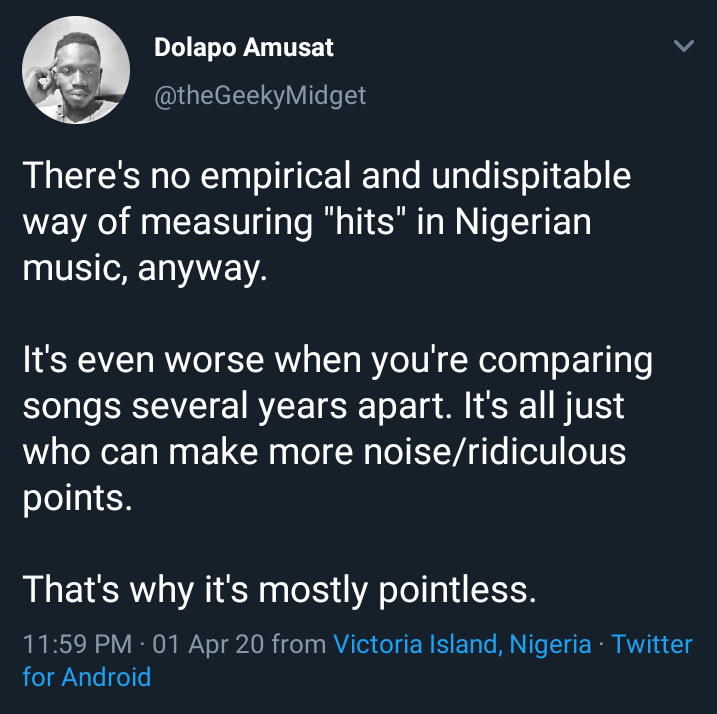Masterkraft & Pheelz Took Different Approaches To Their Battle… A Plus For The Fun On The Night [Review]
![Masterkraft & Pheelz Took Different Approaches To Their Battle Tactics... A Plus For The Fun Of The Night [Review]](https://notjustok.com/wp-content/uploads/2020/04/Screenshot_20200402-023004.png)
Producers Masterkraft and Pheelz went against each other in a Battle of the Hits
Masterkraft and Pheelz Took Different Approaches To Their Battle… A Plus For The Fun On The Night [Review]
Sarz and Shizzi, yesterday, gave us a Battle of the Hits which proved to be more enjoyable than we ever imagined. In an industry where the bulk of the attention goes to the artists, it has become commonplace to think hits come out from nowhere.
With the COVID-19 , we’ve been forced to stay indoors. Some states in Nigeria (prominently Lagos and Abuja) are on lockdown currently. And as our life patterns becomes altered, we seek new ways of entertainment. It’s all on the internet, really. Enough laughter and vibes to keep the boredom away.
That was what Sarz and Shizzi gave us: over two hours of premium entertainment. They also reminded us that producers deserve way more recognition than they get. A Wizkid hit song doesn’t fall out of the sky, neither does a Davido.
Due to the excitement from the Sarz and Shizzi battle, many people went on Twitter and elsewhere to demand more battles. Different producers were asked to do something similar, as pairs were pitted against each other.
SEE ALSO: Sarz vs Shizzi: Battle of Hits – The Complete Playlist
Quickly, another challenge was set: Masterkraft vs. Pheelz. It was a battle bound to be entertaining, as both producers have many hits between them and could combine for 30+ years in the industry.
Slated for 10PM on Wednesday, we kept await, and it happened. Although it began to a series of network/Instagram issues, soon enough, we were able to settle into the battle, as both seasoned producers played songs off their catalogue.
These are our takeaway from the battle between Masterkraft and Pheelz.
Pheelz the trash talker
One of the highlights of Wednesday night was Sarz’s presumed condescending tone, with his facial expressions and comments (“that’s cute” being the most popular). It was however, a spice up of things on the night, as a too friendly sparring might have dulled things a bit.
Yesterday, Pheelz took a similar route, constantly on the offense and finding comebacks to every Masterkraft song with comments like “You Try,” and then going on to say the next song (to be played by him) is bigger. Some standout disses from Pheelz were:
1. When Masterkraft played “Life is Eazi” and Pheelz said it wasn’t a hit, then going on to play “Surrender,” an arguably bigger Mr. Eazi song.
2. Masterkraft attempted to use the views of a particular song’s video to attest to its acclaim but Pheelz dismissed him very humorously and quite intelligently, saying he (Masterkraft) wasn’t the director of the video.
Masterkraft has the range, Pheelz has the hits
Clearly the older and more versatile of the two artistes, Masterkraft’s production prodigy go as far back as twenty years, and yesterday night, he showed the range of his catalog.
Sunny Nweke (as Masterkraft is fondly called) played songs from quite a number of artistes, like Pulse, Vector, Chidinma, Phyno, Jaywon, while Pheelz, noticeably played more recent songs, albeit he had the hits, with most songs from the YBNL camp and songs from other minority artistes like Teni, Vector, etc. making his set.
This difference in approach was most captured when Masterkraft, ever reliant on nostalgia, played “Fada Fada,” the song which began Phyno’s blaze into the upbeat Igbo worship subgenre. For a comeback, Pheelz played “Onyeoma,” a newer song realized from the fiber of the Masterkraft-produced track.
We do not have a metric for hits
Over the night, both producers (mostly Pheelz) would attempt to playfully downplay the opponent’s song by suggesting it wasn’t a hit. “Obiagu,” the Masterkraft-produced song, gave an exciting time to the streamers. No doubt helped by its vintage Highlife production, it was also on the soundtrack of Genevieve Nnaji’s Lionheart, a film which generated huge buzz in Nigeria and beyond. However, Pheelz felt it wasn’t a hit.
Many came for him. To them, he was reaching. But it leaves important questions to be asked. Will Pheelz, a 25-year old who spends a lot of time with Street Hop acts and their music, know “Obiagu” as a hit? What was its impact in, say, Mushin or Lagos Island?


Ultimately, what we term “a hit” is determined by a number of factors but for now, those are all opinion-based. Unlike the Billboard charts and all that, we do not a solid metric for determining a hit song.
Important messages/moments on the live stream
Obviously, the most important moment on the live stream was also its most emotional: the beautiful moment when “Jawo Jawo” came on and Masterkraft said a tribute to Goldie. The messages of “RIP Goldie” which filled the screen was an emotional moment for me; in these times, as we’re to be emphatic and remember our music icons, their music, and how fiercely we once loved them.
Another was the frequent mention of “social distancing” and sometime along the stream, Pheelz sanitized his hands. It might have been a gesture of slight mischief but it was an important message being passed. It was the both of them being culturally aware and sweet.
“Make de no forget say Baddo na baba”
Olamide has a lot of hits – he’s arguably the greatest hit maker of his generation.
As Pheelz reminded us with songs like Yemi My Lover, Awon Goons Mi, Abule Sowo and a host of others, Baddo na baba, and his name should never be disrespected.
Masterkraft is an OG, Pheelz is a young king
Masterkraft arguably has the most versatile catalog amongst his producer peers. With production credits in genres like Highlife, Gospel, afrobeats, Dancehall, Street Hop, he showed streamers yesterday just why he’s Sunny Nweke.
Pheelz, it should be said, is young, younger than Masterkraft in the business but he has one of the strongest catalogs amongst his mates. As a proof of his genius, Pheelz had begun laying beats for Olamide when he was 18, and went on to define the high energy Street Hop and Hip Hop sound which marked Olamide’s music at the time.
The battle hit an all-time high number of viewers
At some point during the battle between the premium beat makers, live streamers/viewers soared up to twenty one thousand. In some points, it soared even higher, as celebrity attendees like Davido, Vector, Major Bangz, Peruzzi, Asisat Oshoala, DJ Enimoney, M.I Abaga, and many others turned up for the epic clash.
Even higher than Sarz and Shizzi numbers, this means more people are paying attention; no doubt a plus.
In all, we got great content. It feels so good doing these. More importantly, we should know it works to the growth of the culture when we give producers their due flowers. Yesterday night, Masterkraft and Pheelz kept up with the fire started by Sarz and Shizzi.
Who’s next?
The post Masterkraft & Pheelz Took Different Approaches To Their Battle… A Plus For The Fun On The Night [Review] appeared first on Latest Naija Nigerian Music, Songs & Video - Notjustok.
from Latest Naija Nigerian Music, Songs & Video – Notjustok
via EDUPEDIA


Comments
Post a Comment